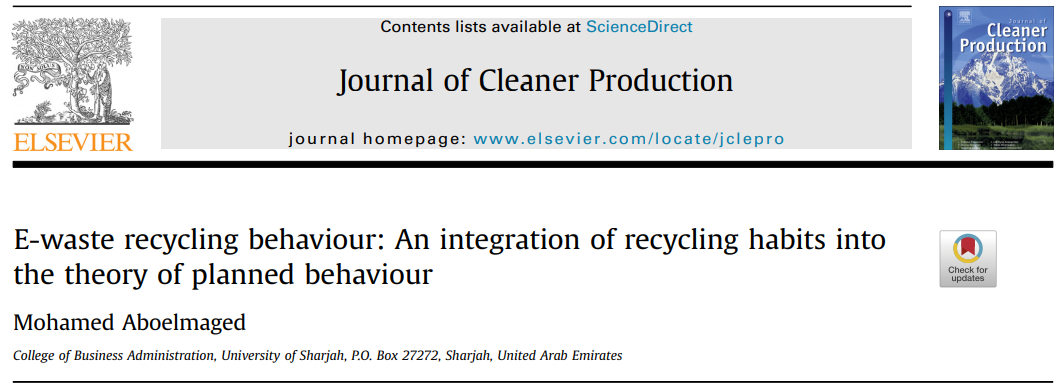
文章发表于JCLP期刊 Volume 278, 1 January 2021, 124182
链接:https://doi.org/10.1016/j.jclepro.2020.124182
文章导读
文章摘要
本研究将回收习惯与计划行为理论模型相结合,旨在研究新兴经济环境下年轻消费者电子废弃物回收意愿的决定因素。作为消费电子产品、产生与处理电子垃圾的重要群体,年轻人在电子废弃物问题上极具研究价值。本文使用一种多元统计方法,即偏最小二乘结构方程模型(PLS-SEM),对调研数据进行分析。该模型能够在一定程度上解释年轻消费者电子废弃物回收意愿中47%的差异性,研究结果反映了较好的解释力,并证实了该模型的稳健性。本研究认为,年轻人的回收习惯与感知态度是预测电子废弃物回收意愿的重要指标。但令人惊讶的是,计划行为理论(TPB)中的主观规范因素与行为控制因素对于年轻消费者的电子废弃物回收意愿并无显著影响。基于上述发现,电子废弃物回收项目应首先聚焦年轻群体对于电子废弃物的态度,并设计具体的引导性提示,使其形成习惯。本文还总结了一些可以改善电子废弃物回收政策的启示。
原文信息

ABSTRACT
This study examines the determinants of e-waste recycling intention among young consumers in an emerging economy context by integrating habits into a prominent model that predicts people’s behaviour, namely, the theory of planned behaviour. Young consumers contribute significantly to the outgrowth of e-waste problem as front-runners in the consumption, generation and management processes. Survey data have been analysed using Partial Least Squares Structural Equation Modelling (PLS-SEM) approach as a multivariate statistical method. The findings show that the integrated model can explain more than 47 per cent of thevariance in the young consumers’ e-waste recycling intention which reflectsgood explanatory power and confirms its robustness. The role of recycling habits and perceived attitudes are demonstrated as strong predictors of young adults’ e-waste recycling intention. Surprisingly, constructs of the theory ofplanned behaviour (TPB) involving subjective norms and behavioural control show no significant influence on the e-waste recycling intention of young consumers. Building on these findings, e-waste recycling programs should first target attitudes and create specific cues that trigger habits. The paper also concludes with several social and practical implications that can fostere-waste recycling policies.
Keywords
e-waste; Recycling; Pro-environmental behaviour; Habits;Theory of planned behaviour; Emerging economy
Direct reference format
Mohamed Aboelmaged. An integration of recycling habits into thetheory of planned behaviour. J. Clean. Prod., 278, 124182.
(来源:JCLP期刊)
